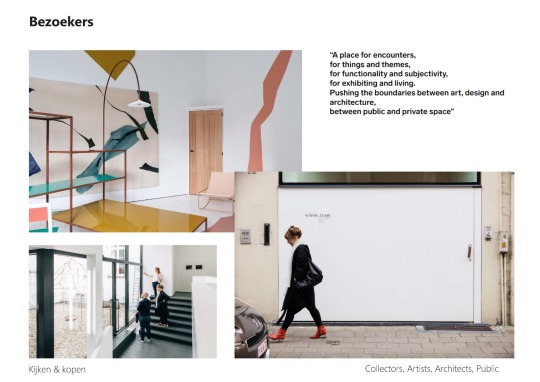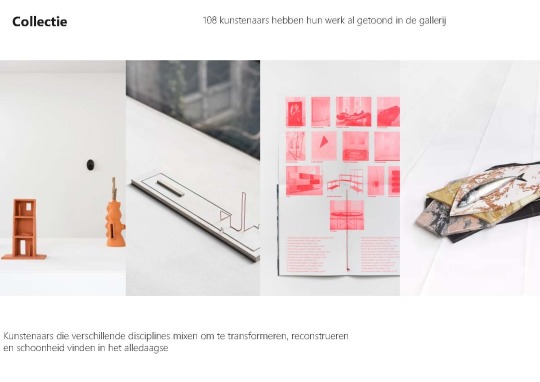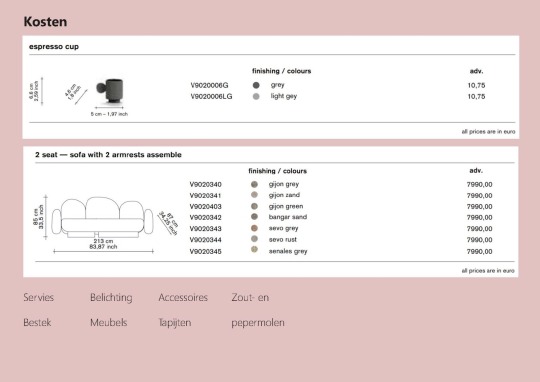#gallerij
Photo

The Nassau BackBag at the Gallery. Enjoy Life with your Hands Free. Feelin' Good !
SOURCES :
https://www.polderdike.com
https://www.polderdike.nl
#polderdike#tassen#bags#pink bag#roze tas#pinkbackpack#roze rugtas#gallery#gallerij#kunst#art#fine art
2 notes
·
View notes
Link
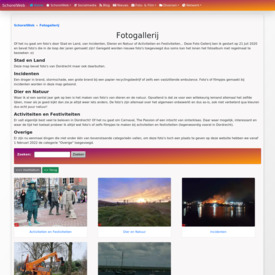
#schorelweb#foto#fotos#foto's#album#fotoalbum#gallery#gallerij#fotogallerij#fotogallery#photos#photoalbum#photogallery#photogallerij#photography#photo
0 notes
Text
De Gallerij is mijn lievelingsronde
0 notes
Link
via BarendrechtNU – Alle actualiteiten in en om Barendrecht
0 notes
Text
DOVDH - Hoofdstuk 41-43
Hallo Lezers,
Dit is wat ik tot nu gelezen heb in het boek de ontdekking van de hemel, vanaf hoofdstuk 41 t.e.m 44.
Hoofdstuk 41, p 539
Quinten was zeven jaar toen Max plotseling twee keer binnen veertien dagem een kaars aanstak. Eerst kreeg Quinte te horen, dat zijn overgrootmoeder was gestorven , de oude mevrouw Haken; en vervolgens zijn grootvader, Hendrikus Jacobus Andreas Quist. Quinten ging niet naar de grootmoeders begrafenis, maar wel naar die van zijn grootvader. Hij zag zijn grootvader inmiddels veel meer dan zijn grootmoeder waar hij nooit tegen had gesproken. Daardoor wouden Sophia en Max hem niet belasten met de droevenis van iemand die hij niet kende.
Tijdens de begrafenis stapte Onno en Quinten naar de kist van Hendrikus. Erna vroeg Quinten aan Onno of hij zijn moeder kon zien, voordat het "te laat" was en hij misschien ook zijn moeder verwaal kon zeggen. Hij verlangde naar haar en Onno kon niks anders doen maar dan te knikken.
Onno bracht hem de volgende dag naar zijn moeder. Hij vroeg aan Onno hoe het kan dat zijn moeder nooit meer kan wakker worden, maar het het enige wat Onno kon doen was de waarheid zeggen: dat ze nooit meer wakker word. Nadat Quinten had gevraagd hoe ze in zo een toestand was gekomen vertelde Onno het hele verhaal aan zijn zoon(hij vertelde wel niet dat Ada eerst de vriendin van Max was).
Hoofdstuk 42, p 553
In maart 1977 viel het kabinet en er werden nieuwe verkiezingen gehouden, waarbij Onno's partij de grote winnaar was: dat betekende vermoedelijk, dat er een ministerschap voor hem in het verschiet lag. Maar aan het eind van de landurigste politieke barensweeen die Nederland ooit had gekend, negen maanden, verkozen de christendemocraten op de valreeo toch de conservatieven boven de socialisten, en van de ene dag op de andere was hij werkloos. Hij was verrassend blij. Hij zat zelfs te fluiten. Adieu den Haag, naar Amsterdam ging hij. Hij had nog een heel leven voor de boeg! En eindelijk zou hij ook meer tijd hebben voor Quinten.
Maar toen dacht hij er beter over en besprak hij het met zijn vriendin Helga. Uiteindelijk besloot hij om zich bij de oppositie te voegen, die nu geleid werd door de ex-premier. voor vier jaar werkte hij daar en tijdens de gedurende vier jaar die het" rechtse, hondse, schandelijke" kabinet aan de macht was, als pendant van de "spaans-katholieke-habsburgse overheersing in de zestiende eeuw", zag hij Quinten nog minder dan voordien. Alleen bij feestdagen en begrafenissen zagen ze elkaar.
Sophia en Max hadden geen "hechte" relatie meer. Daardoor begin hij iet met een secetaresse op de sterrenwacht in Dwingeloo. Hij vertelde het na enkele maanden tegen Sophia, zij moedigde hem aan.
Naar mate Quinten opgroeide, werd hij voor iedereen steeds onbegrijpelijker. Hij had geen vrienden en las alleen maar. Vanaf dat hij zijn moeder had bezocht kreeg hij nachtmerries. De nachtmerries gingen over een plek, dat veranderde maar toch hetzelfde bleef. Het ene moment was hij in een gallerij het andere in een labyrinth vol kamers. Hij noemde het "de Burcht".
Quinten presteerde niet slecht op school, maar ook niet goed. Hij deed het alleen goed in de vakken dat hem interesseerde. Themaat, zijn leraar, vond hem een interessante jongen. Hij hielp hem met zijn vragen en ideeen over de thema's dat hem boeide, dus vooral over architectuur, beeldhouw en kunst. Themaat gaf hem een boek, Piranesi's Carceri. De plek waar hij over droomde stond in het boek.
Hoofdstuk 43, p 569
Begin zomer 1980 werden in Westerbrok de twee nieuwe, verijdbare spiegels in gebruik gesteld. De comissaris, de koningin, heel Leiden en Dwingeloo kwamen kijken. Quinten was nu in het zesde leerjaar en begon stilletjes aan meer dingen over zijn leven en zijn toestand te begrijpen. Onno, Max, Proctor, Sophia en Quinten spraken over hoe je de toekomst kan zien door de sterren en hoe de mensheid zich evolueert.
Procor, Max en Onno (Quinten luisterde) praatte verder ook over Francis Bacon en hoe hij aan de wieg had gestaan bij Vondels Lucifer en hoe Bacon in werkelijkheid niet stierf in 1626, maar in 1654. Hij had 6 jaar aan een een treurspel gewerkt . Honderden tekstuele bewijzen had hij langzamerhand verzameld voor zijn stelling, dat het idee om een stuk te schrijven over lucifers ondergang, van Bacon afkomstig was. Hij koos Vondel uit om het stuk te schrijven, omdat hij katholiek was (Francis Bacon was anglicaan) en hij was ook de enige toen die goed een toneelstuk/tragedie kon schrijven ( extra info: Het toneelstuk Lucifer is een in de hemel gesitueerd treurspel van Joost van den Vondel, geschreven van 1648 tot 1654 en in première gegaan op 2 februari 1654 in de Amsterdamse schouwburg). Ookal snapte Quinten maar de helft van het gesprek, zulke dingen vergat hij nooit.
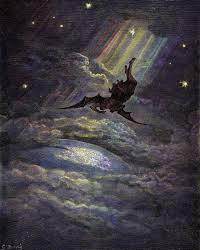
Quinten ging naar het gymnasium en maakte nog steeds niet zoveel vrienden. Themaat voedde zijn obsessie met architectuur en gebouwen en moedigde hem aan om 'het' gebouw te vinden van zijn dromen. Hij leerde het meeste bij van Max en Onno. Ze waren ongeloofelijk slim en hun hersenen explodeerden van kennis, wachtend om gedeeld te worden.
Dit was het voor nu. Nog een klein bedankje dta je mijn blog leest!
Josephine
1 note
·
View note
Text
LIFE – planten – dieren – mensen – artiesten- ART – traditioneel – schilderkunst – beeldhouwkunst – tentoonstellen – gallerij – museum – architectuur – huis – thuis – mens – LIFE – ademen – voelen – horen – zien – meemaken – begrijpen – reden geven aan – ART – maken – produceren – leren – groeien – LIFE – mens – artiest – ART – schilder – beeldhouwer – architect – aangeleerd – academie – elite – exclusief – selectief – groepen – sociale klasse – LEVEN – alles – elke dag – eender wat – iets wat er al is – wat als dat ART is – LIFE – ART – LIFE – ART – SHIFT – ART – LIFE – ART – LIFE – ART – foto’s – billboards – adverdenties – films – sciencefiction – collage – experiment – interpretatie door – kijker – mens – LIFE – pop cultuur – massa cultuur – cultuur – populaire cultuur wordt – ART – minder traditioneel – creatief – vrij – toegankelijk – jong – LIFE – dagelijks leven – alledaagse dingen – ART – breder publiek – meer meningen – meer interpretaties – meer cultuur – meer LIFE
0 notes
Photo

by Herman de Vries
54 notes
·
View notes
Photo

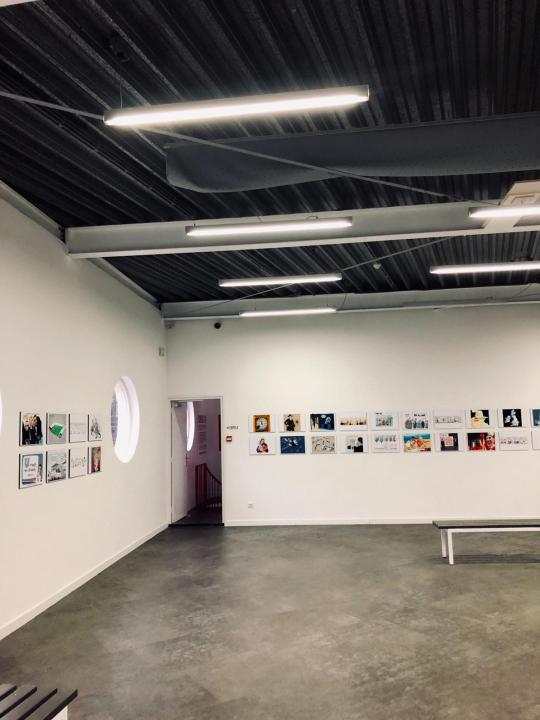
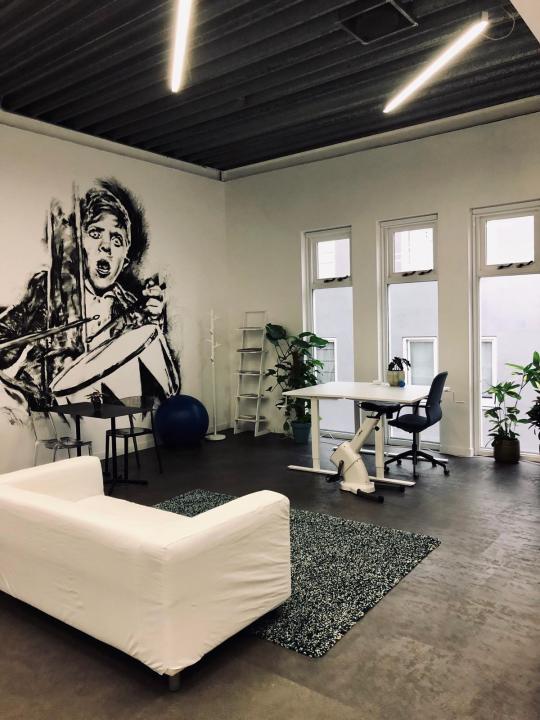
1. Uitzicht op de Oude Markt vanuit de keuken
2. Expositie op de eerste verdieping
3. Werkplek in het gebouw
0 notes
Text
speaking your language
part 5 of atelier heart
ikemen vampire: temptation in the dark
theo van gogh/mc, vincent | T | 2506 | [ao3 in bio]
spoiler warning: key plot points mentioned in chapter 10 and 15 are used in this fic, with the vaguest hint of chapter 24 at the tail end.
also: my deepest apologies to people who actually speak dutch, i’m taking all of your con/crit with an open heart.
The first Dutch word you’d ever learned was hondje.
Dog, you’d learned. Or puppy. Not the worst first word to learn in a new language, but definitely up there if one considers the fact that it was meant to refer to you. It’s not that bad, though, and puppies are pretty cute, so it was easy to let it slide.
Then, knabbeltje. A snack, a little nibble. Not that Theo has any interest in taking any bite at you. He’s made that clear from the first night. For someone who’s so good at smooth talking his clients, that was a weird word to use for you, you’d thought. But, Theo has his reasons, you supposed.
Which is exactly what makes you so keen into learning the language.
You’ve learned that a little bribery can get you a long way when it comes to Theo—as in, get him invested and you’re good to go—so that morning, you take the extra effort. You rise earlier than you’ve ever done to prepare pancakes for him, whipping the egg whites with as much vigor as you can muster to ensure that the pancakes are as fluffy as humanly possible. You make sure every portion is peak jiggly, and they are, because you can’t help but tap them contentedly on the plate as they cooled, watching them wobble. Then, like a cherry on top, you take out the special pancake syrup you’d bought the day before, having come with Sebastian to buy groceries, the one you’d chosen specifically for Theo. (And oh, only for Theo, because no other mansion resident with the right mind about sugar would dare try it.)
You try to keep it a secret as long as you can, presenting the plate of sweet goodness to Theo once he’s come down from his room. The both of you are alone at the dining table, because it’s still way too early. He’s already dressed and ready to go, even if it’s just six-thirty a.m., and if he has a comment about you being already up when you usually aren’t, he holds it back.
Good choice—you want him to focus on the pancakes, and a smile erupts on both of your faces when he begins to munch happily away on the syrup-drenched disaster of a plate. The sigh he makes goes straight under your skin.
But you can’t let your guard down, because you still have a mission, and that is: to convince him.
When his shoulders relax, you finally pop the question.
“Won’t you please teach me some Dutch?”
Theo’s fork hovers in front of his mouth. “What?”
Over the past week, you’d learned two basic Dutch phrases from Theo, in the notes he’d written for you. Tot ziens, which he said meant goodbye for now, and Dank je, thank you. That makes four total things you can now say in Dutch. Not much, but clearly already much more than what you started with. You belatedly realize you don’t actually have a reason you can dare tell him as to why you want to learn Dutch, but never mind that.
“I said, won’t you teach me some Dutch, sometime?” you repeat. “I still have three weeks to spend out here, and while my French and English are pretty fine, I can’t really keep up with your Dutch. I thought it wouldn’t be so bad to learn, especially since you’re bringing me along to work anyway.”
Cringe. That wasn’t a good reason, you were sure. But maybe the pancakes will make Theo’s steel heart a little more malleable for your favor.
What other reasons do you have? Well, maybe he’ll be able to better explain to you certain things about art and their work if he reverts to his mother tongue, right? There are certain things translations miss, after all, and maybe if you learned the language, it’ll be much easier on the both of you? Oh, wait, but does that mean you’ll be intruding on the shared, perhaps too-personal language he shares with his brother? Oh, no, that wasn’t what you meant. Maybe—
“Dutch syllables are very different from English and French,” Theo says, instead, after a long moment, a not-really yes or no.
You narrow your eyes with his response, but quickly realize maybe he’s just testing your will to do it. You are motivated. Learning languages are fun. “That’s fine, nothing practice won’t conquer. It’s really not cute that all I know how to say is stuff like dog and snack.” He snorts. “I mean, if you’re not up to it…”
Theo sighs. A sigh of defeat. “Okay, but you’ll have to work hard for it.”
You grin. That morning, you learn pannenkoek and siroop.
-
The learning curve for languages always differ according to the person, their own mother tongue, the language itself, and of course the work one puts into studying it, but one factor that really ups the vocabulary and grammar retention is being able to hear the language being spoken, rather regularly. This is how you end up having Vincent help you out with your little adventure in learning Dutch.
Having gotten used to conversing in French to each other, the brothers take time to adjust switching to their mother tongue for you. But when you’re looking at them with amazement exchanging words you can barely say, much less understand, there’s little they can’t do.
(Theo is mortified to have to surrender to it, but when he’s transparent to his brother, does he have any other choice?)
All of this happens just in time for the preparation for the exhibit to begin. The three of you spend much time together, selecting paintings, planning the exhibit orders, looking for themes. The two decide that this isn’t just a good opportunity to learn, it might also be in your best interests if they team-teach you the language.
Counting the paintings, Vincent teaches you the basics, hauling canvas after canvas going—een, twee, drie, vier, vijf, zes, zeven, acht, negen, tien. With the chosen paintings laid out on the floor, you point out colors and he teaches you their names—rood, oranje, geel, groen, blauw, paars, roze. He teaches you how to introduce yourself, say your name, teaches you greetings, basic nouns, the kind you will learn in introductory Dutch classes in universities if you were back in the 21st century. Vincent is gentle and kind and claps when you get the words right. (It makes you feel like a child. The word is kind.)
Theo, on the other hand, focuses on teaching you things related to the work at hand: een gallerij, een tentoonstelling, een schilderij—of course, a gallery, an exhibit, a painting. Teaches you words to describe the things you see, like mooi, for beautiful, and interessant, for interesting. He corrects your grammar, teaches you how to say, “let’s go home” or “I’m hungry, let’s eat”. When you don’t get the phrase right, he gives you a look, completely ignoring what you’d just said until you finally say it right. He corrects your pronunciation to the best of both your abilities.
He’s also found great joy in teaching you phrases before telling you what it means, and that’s how you’ve practiced saying misschien ben ik een hond die een jurk draagt as if you were a dog wearing a dress.
But you hear his laughter and it doesn’t matter as much.
-
Theo buys you a notebook to compile the words you’ve learned. In only a few days, you’ve amassed a wide range of words you now sprinkle throughout your sentences like a playful multilingual. You’ve gotten odd stares, sure, but it’s always better to keep using the words you’ve learned, because that’s how you make it seem natural.
So far, though, for the ones you’ve learned, it’s the Dutch verbs that are trickier than you expected. The conjugations keep tripping you up. They seem simple, and in fact a lot of them sound pretty close to their English counterparts, but Theo’s stares and (im)patient waiting for you to correct what you’ve said betray your misuse of them over and over again.
So at night, you practice. Staan for stand. Zeggen for say. Helpen for help. Leren, for learn.
Blijven, for stay.
Sorting Vincent’s paintings at the gallery Marquis Vollard had lent you, you bump shoulders with Theo and ask, “How do I say, ‘I love this’, in Dutch?” as you pull out a canvas from the stack.
“Ik hou hiervan.”
“Hmm.” You put aside the painting and pull out your notebook and pen. “So hou means love?”
“Houden, means to hold,” Theo says. “Like a hand, or a book. Hou van is what’s used for love.”
“So it’s ik hou van…?”
“Ik hou van jou,” he answers, without a thought.
A long moment, before the realization hits.
He turns away from you, and you’re thankful because of how hot your face feels.
“You use the same for other things,” Theo says. His voice is as even as always, and it makes your heart fall a little. “Like paintings, and art.”
“I see,” you say, before dropping the topic altogether.
You’re getting good at this keeping your heart tucked away thing, so you write ik hou van jou in looping letters on your notebook before returning to work.
All the while thinking: to love means to hold.
-
So you hold him.
After the fire.
After wheatfields.
After Gauguin.
Even when it hurts to hold.
Even when it’s him that’s let you go.
Even after you’ve heard the gunshot.
You hold on to him, even if you’re not sure if the both of you are speaking the same language anymore, if you’ll still ever be able to understand the other.
You hold on even if there’s blood everywhere.
Blijven means to stay.
And herstellen… means to recover.
The hospital is rather cozy. Quite similar to the ones in the 21st century, but still different from the sterile whiteness of it. You sit next to Theo on the bed, waiting for him to speak. You are alone for the first time since he’d said goodbye.
You hadn’t left him yet.
That night, he presses the words please forgive me into your lips, praying it’s the last time he’ll ever have to hurt you that way. You cradle his face in your palms and hold his love in your hands gently, as you exchange promises that it will no longer break.
-
You learn a lot of words after that, too.
Like wheatfields, tarwevelden. And forever, voor altijd. Each word learned is linked to a memory, making them hard to forget. Like katje, the day a kitten spooks Theo in the garden. Lekker, once you’ve made him a delicious batch of syrupy pancakes once again. Schat, treasure, and schatje—that is, you.
You’re still years of practice away from being fluent in Dutch, but at this point you’re fluent in Theo, and that’s really what matters.
And one night, Theo’s got you in a kiss when the both of you enter the room. You push at him just enough so that he sees the look on your face. “Teach me Dutch,” you say, half-teasing, and he laughs as he joins you in stripping off your clothes.
There’s no easier way to remember vocabulary than to learn it viscerally, carve it against your skin into a memory, and Dutch is no exception. You both fall into the bed in an entanglement of limbs, righting yourselves up just to catch each other in another kiss.
You cup both his cheeks, and he teaches you, “gezicht.” Face.
You kiss his forehead, and he says, “voorhoofd.”
You gently run your thumbs under his eyes, and he says, “ogen.”
“Kus,” he says, “is like this,” pulling you toward him in a kiss. You sigh into the word without much grace.
Pressing his lips against your throat, he teaches you, “hals.”
Grazing a fang onto your shoulder, “schouder.”
He sucks a bruise onto your collarbone and says, “sleutelbeen.”
The sensation makes your hand fly onto his hair, and with a chuckle he teaches, “haar.”
He takes your hand in his, presses a kiss onto your wrist. “pols.”
You cup Theo’s face in your hand and scour his body for more words, like a dictionary made of flesh. Your free hand grazes the scar on his back and with a sigh he teaches you “litteken.” You wonder if the same word applies to those found in his heart.
“Rug,” he teaches you, the vast expanse of his back.
Your hand goes down to his waist and he says, “taille.” You touch his hip and he says “heup.”
He gives you a mischievous look, one that suited his boyish features so much, your heart nearly stops. “Where is je favoriet?” he asks you, teasing. A phrase you’d learnt earlier. Your face flushes at the connotation but you refuse to give him the answer he wants, tapping his nose (“neus”) with a finger.
“You are mijn favoriet,” you respond, and you know when he steals your lips even more deeply than earlier is only because you’ve made him flustered. You laugh into the kiss and he growls.
Never one to be outdone, Theo pushes you backward onto the bed. The two of you share a short moment of intimacy, staring at each other’s eyes with the kind of searing fondness that always leaves you breathless, before he’s on his way down again to teach you.
“Dij,” he mouths against your thigh; lifts your leg up toward him, pressing kisses all the way down. “Knie. Kalf. Voet.” You nearly kick him when he kisses your foot but he holds you still. “Enkel.”
“But I haven’t taught you the most important one,” he says. Crawling back upward, he cups the apex of your thighs and grins. “Paradijs,” he says, and you hit him on the shoulder, covering your mouth with one hand. The laugh that rolls out of him makes your embarrassment worth it.
You pull him upward to take another kiss from him, and while you could have at it tonight, you just want to bask in his presence. You whisper “omhelzing?” hoping to get the pronunciation right or else he’ll ignore your plea to cuddle, thankful that he pulls you up to switch position.
He rests his head on your chest and says, “hoofdkussen,” with a sigh, and you’re not an expert yet, but you’re pretty sure that’s not what it should be.
You push him off with a groan (“you’re heavy!”) and the two of you switch to your usual cuddling position, Theo holding you in his arms and your head on his chest.
You don’t realize your hand has hovered over the spot on his chest right over his heart until he places his hand on yours.
Whispers into the listening night air:
“Voor altijd van jou.”
---
in the atelier: The Kiss by Gustav Klimt

also in the atelier, hidden somewhere hard to find, is Gustave Courbet's L'Origine du monde. (and because it is hidden, you’ll have to find it on your own. do be careful when you look it up though.) that painting singlehandedly inspired the paradijs bit, so it has to be mentioned.
#ikemen vampire#ikevamp#ikemen vampire theo#ikevamp theo#ikevam#ikevam theo#atelier heart#fic#me and my 41 duolingo dutch crowns worked hard for this#speaking your language
90 notes
·
View notes
Text
Keith Haring
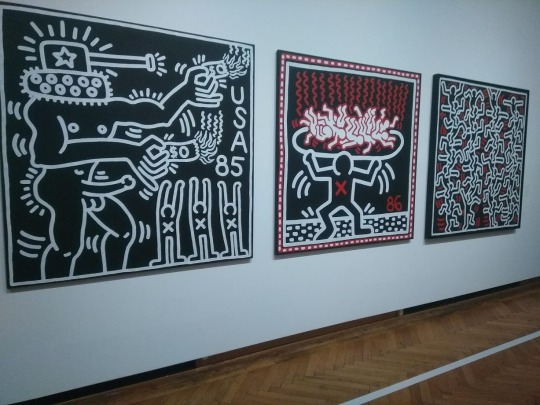
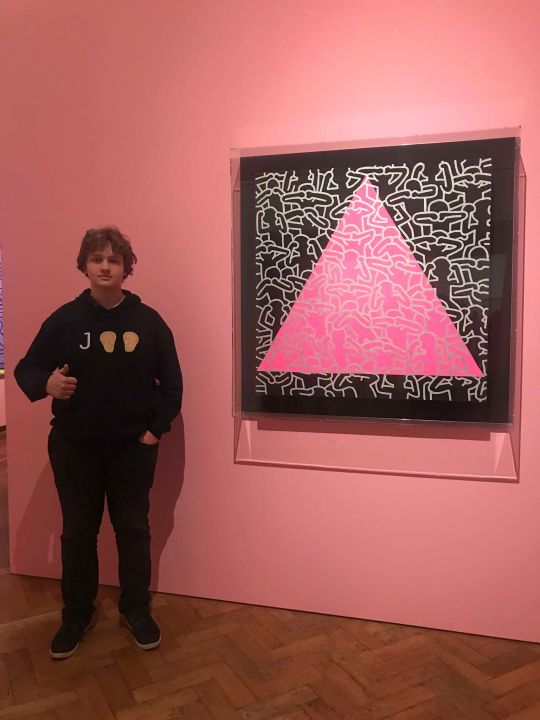

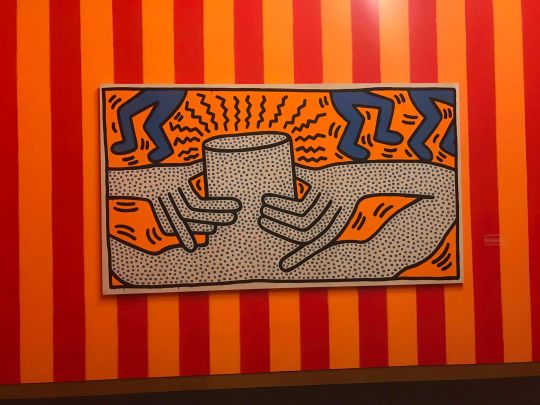
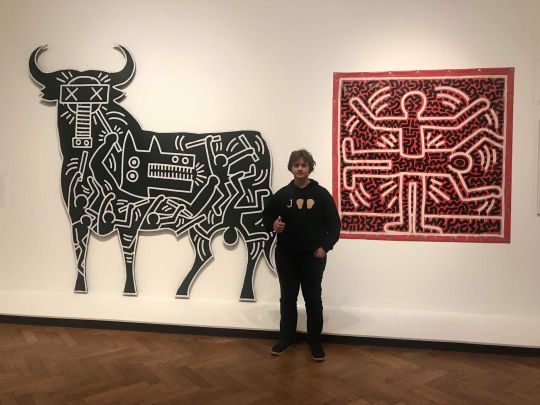
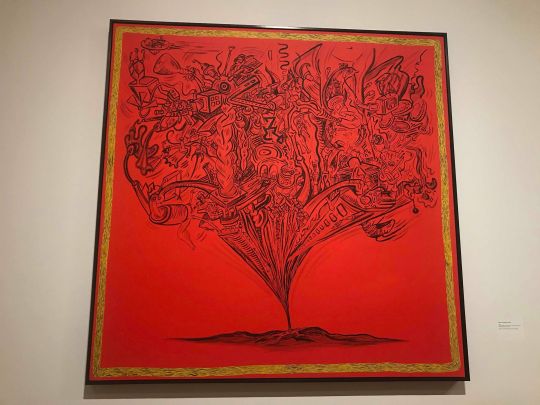
Op 4 januari 2020 ben ik naar de tentoonstelling van Keith Haring geweest, deze tentoonstelling vond plaats in de Bozar in Brussel. Ik ben samen met enkele familieleden met de trein naar Brussel getrokken. Keith Haring geboren in 1958 en hij groeide op in Kutztown en verhuisde later naar New-York, meer bepaald in East Village. Deze wijk was een magneet voor opkomende kunstenaars, en hier raakte hij al snel bevriend met ‘beroemde’ mensen zoals Madonna, Jean-Michel Basquiat en Grace Jones. Toen keith opgroeide waren Mickey-mouse en Andy Warhol enkele van zijn inspiratiebronnen, Andy Warhol nog net iets langer. Toen hij in New-York woonde gebruikte hij vooral de metro’s als zijn canvas, hij had een zeer groot visueel vocabularium gecreëerd in de straten. Hij drukte vooral zijn stempel op het metronetwerk. hier maakte hij talloze tekeningen met krijt op lege advertentieborden als hij de kans kreeg. Hij maakte ook murals bovengronds of schilderijen, deze werden zeer duur verkocht.
Wat velen misschien ook niet weten is dat Keith een activist was, dit was met onderwerpen als racisme, kernoorlog, homofobie en de strijd tegen HIV. Zelf stierf hij aan de gevolgen van het HIV-virus in 1990. Deze onderwerpen zijn vaak te zien in zijn kunstwerken. Dit is iets wat mij ook opviel toen ik de kunstwerken aanschouwde. Ik herkende meteen zijn stijl in de mannetjes die in zo goed als elk werk voor kwamen. Ik vond het zeer leuk om de gallerij te bezoeken en de kunstwerken te bewonderen, er waren ook enkele meer bekende werken bij zoals de taxi-motorkap die hij helemaal heeft veranderd of enkele van zijn zeer grote werken. Ik vond de stijl waarmee hij schilderde zeer mooi en heb erg genoten van al de draaiingen die overal in verwerkt zaten.
2 notes
·
View notes
Photo

De Kinderdijk is al door heel veel fotografen vastgelegd. Maar dit is toch een heel mooi plaatje geworden. @rick_bekker GEFELICITEERD 🏆 Jij bent een van onze ontdekkingsreizigers van de dag! . Bedankt voor het gebruiken van #DUTCHWOODS en het delen van deze prachige foto! Vergeet niet zijn/haar gallerij te bekijken! ✦ #dutchwoods_rick_bekker ↟ Je bent uitgekozen door: @fairygirl36 Volg je mij al? ↟ ☑ Volg @DUTCHWOODS ☑ Plaats je mooiste foto! ☑ & tag #DUTCHWOODS ↟ Meet onze moderators: @wildwithchris / @jeanine.verbraak/ @travels.of.yvette.e_ / @fairygirl36 ↟ Join onze Fotografie groep ‘Dutchwoods’ op Facebook, link in Bio! ↟ #Dutchwoods #Nederland #Holland #fotografie #photography #natuurfotografie #bestofholland #visitholland #reizen #hollandinbeeld #nederlandondekt #dernederlanden #bestofholland #natuur #naturelovers #toerisme #europe #earth #kinderdijk #molens #zonlicht #zonsopkomst (bij Kinderdijk, Netherlands) https://www.instagram.com/p/BzhXbaiguBT/?igshid=tv8bme1x5xor
#dutchwoods#dutchwoods_rick_bekker#nederland#holland#fotografie#photography#natuurfotografie#bestofholland#visitholland#reizen#hollandinbeeld#nederlandondekt#dernederlanden#natuur#naturelovers#toerisme#europe#earth#kinderdijk#molens#zonlicht#zonsopkomst
2 notes
·
View notes
Text
Grand Opening Gallery Sofie Van de Velde
Ik ben zaterdag 7 september naar de opening gegaan van de gallerij genaamd "Sofie Van de Velde".
Er werd werk van 2 jonge kunstenaars tentoongesteld: "Charline Tyberghein" en "Carole Vanderlinden".


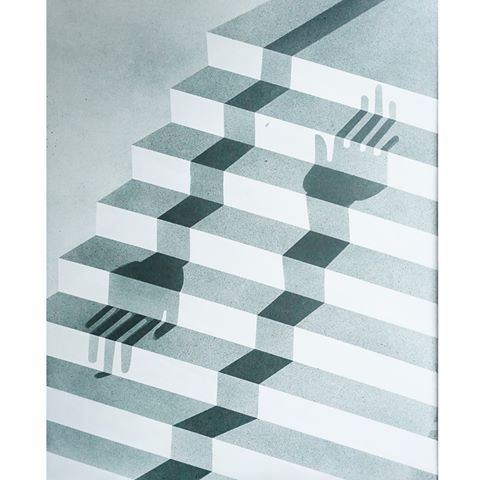

Persoonlijk vond ik het werk van Charline Tyberghein het interessantst, ik ben een fan van geometrie (vandaar ook mijn interesse in kubistische architectuur) en dagdagelijkse vormen die abstract in beeld worden gebracht. Er werd ook soms gespeeld met optische illusies. Een grote aanrder.
Het werk van Carole Vanderlinden bestond vooral uit abstracte schilderkunst. De rode draad bestond uitgezichten die je overal wel in kon terugvinden. Ik vond het niet bepaald mooi, maar wel een leuke zoektocht om telkens naar de ogen, neus en mond te zoeken in abstracte werken. Iets dat je niet mooi vind is daarom ook niet interessant. Ik zie mezelf ook wel werk maken waarbij observatie een rol speelt, dat lijkt me zelfs erg interessant. Maar ik zou dat niet doen adhv. schilderijen (daarvoor kan ik niet goed genoeg schilderen) maar bijvoorbeeld wel door bestek zo te plaatsen en dan vervolgens te fotograferen.
Het was een mooie gallerij, en de 2 jonge kunstenaars hun werk pasten mooi samen. Ik vind het een grote aanrader en heb er zelf zeker van genoten.
3 notes
·
View notes
Text
De Gallerij is soms echt een kutronde... Ik vind hem leuk mee te doen. De kandidaten worden soms echt grandioos genaaid
Hoezo mag de radiopresentatrice teksten van liedjes zingen maar moeten komedian 1 een stad raden met een vervaagde prent + rare tekst & komedian 2 een palindroom ronde doen?
#de slimste mens ter wereld#21x08#woestijnvis#alle respect wel naar maureen#dit is haar schuld niet#soundos & alex' reactie was wel hysterisch#lb
0 notes
Link
via BarendrechtNU – Alle actualiteiten in en om Barendrecht
0 notes
Note
51 aub
Ik heb een gallerij van Bēhance en de apple standaard achtergronden aanstaan op mijn desktop, op mijn macbook is dat een dynamic wallapaper van nasa en op mijn mobiles zijn het de illustraties van felicia chiao :) (die zijn insane echt)
1 note
·
View note






